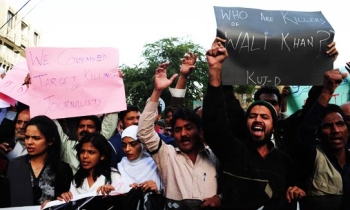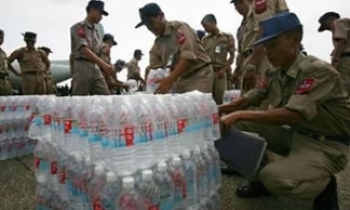Journalist and human rights activist Emadoldin Baghi was rushed to hospital after suffering a double heart attack in Tehran’s Evin prison on 26 December and was returned to a general wing of the prison yesterday evening.
Baghi was arrested on 14 October to serve a one-year sentence he was given in November 2004 for writing a book that accused the Iranian authorities of involvement in the murders of intellectuals and journalists in 1998. But new charges have been brought against him in a new trial.
After an initial hearing, he was transferred to section 209 of Tehran’s Evin prison and placed in solitary confinement. Thereafter, he has been interrogated while blindfolded and with his wrists bound, although this practice is expressly forbidden in Iran. He was taken before the 1st chamber of the Tehran revolutionary court again, on 22 October, without his lawyers being notified. Iranian journalists have in the past been forced to make false confession, sometimes publicly, after being subjected to
repeated intimidation.
Baghi has a long history of arrests and trials. He first went to prison in 2000, when he was given a three-year sentence for "attacking national security." Then he got the one-year sentence in November 2004. And he recently received another three-year sentence for "activities against national security†and “publicity in favour of the regime’s opponents.†Baghi was arrested when he responded to a summons to report to a Tehran revolutionary court. The summons listed new charges against him. His lawyer said he is now accused of propaganda against the government and “publishing secret government documents obtained with the help of prisoners held for security violations in special centres.â€
Reporters Without Borders expressed worry on Baghi’s condition stating they are “unacceptableâ€. The press freedom organization also said, “He has been in solitary confinement ever since he was first taken to Evin, as if imprisonment was not already enough punishment. As his state of health has worsened steadily during the past two months, it is inconceivable that he should be expected to convalesce in prison.â€
He has defended human rights, both as the editor of the daily newspaper Jomhuriat ("Republican" in Farsi) - which was closed on the orders of the Tehran prosecutor in July 2004 - and as the founder of an organization that defends the rights of prisoners of conscience. He was banned from travelling outside of the country on 5 October 2004. In his book, "The Tragedy of Democracy in Iran," Baghi accused the Iranian authorities of being involved in a series of murders of intellectuals and journalists in 1998.
Baghi being a leading advocate of the rights of prisoners of conscience in Iran, his arrest was strongly condemned by the press freedom organization. Reporters Without Borders had also urged all democratic countries to firmly condemn Baghi’s arbitrary arrest and also called for the release of all of Iran’s prisoners of conscience, who are growing in number by the month.
The authorities recently closed a monthly newspaper edited by his wife, called Jameh No ("New Society" in Farsi). At the start of May, Baghi and 255 other journalists signed a petition calling for a fair presidential election and the unconditional release of political prisoners, especially journalists. His wife, Fatemeh Kamali Ahmad Sarahi, and his daughter Maryam Baghi, were given three-year suspended prison sentences and five years of probation for taking part in a series of human rights workshops in Dubai in 2004. The charges were “meeting and colluding with the aim of disrupting national security.â€
Baghi was rushed to Tehran’s Khamar Bani Hachem after his double heart attack. His lawyer, Saleh Nikbakht, and his family had spent 24 hours without any news of him until he was taken back to Evin, he was put in a new cell in section 350 of the prison.
Saleh Nikbakht told Reporters Without Borders that the deterioration in Baghi’s health was mainly due to the appalling conditions in the prison and to the harassment to which he has been subjected during interrogation sessions. “Emadoldin Baghi will not survive another heart attack,†he said.
"I was unable to defend myself in this travesty of a trial which last only a few minutes, and I was barely able to speak," Baghi told Reporters Without Borders. "What kind of trial is it where there is neither lawyer nor judge, or where the judge is prosecutor at the same time and where the defendant is not even told of the charges against him?"
Reporters Without Borders expressed outrage on Baghi’s condition while they brought out “the Iranian authorities stop at nothing in their hounding of Baghi.†The press freedom organisation said, "Held on trumped-up charges for unclear reasons, Baghi is being subjected to interrogations of an unacceptable nature. Iran continually violates the rights of its detainees, subjecting them to mistreatment with the sole aim of extracting confessions." "We point out that the head of the Iranian judiciary, Ayatollah Mahmud Hashemi Shahrudi, recently accused the courts and the police of exceeding their authority and of abusing the law in some of the summonses they issued and the ensuing arbitrary arrests," the organization added.
Meanwhile, Ejlal Ghavami, a reporter for the weekly Payam-e Mardom-e Kurdestan who has been held in the prison of Sanandaj since 9 July, was finally given 10 days leave from the prison on 26 December for treatment to an eye infection that has worsened since his arrest. Reporters Without Borders expressed its concern about the fate of the 11 journalists currently in prison in Iran. In addition to Jamshidi, they include they include three journalists who were arrested at the same time on 14 June : Taghi Rahmani of Omid-é-Zangan, Reza Alijani, the editor of Iran-é-Farda (who is a Reporters Without Borders-Fondation de France laureate), and Hoda Saber, managing editor of Iran-é-Farda.
Rahmani's wife, Narges Mohammadi, told Reporters Without Borders : "The last family visit for the three journalists was on 30 October. Since then, for the past 32 days, neither their lawyers nor their families have received any news of them. We still don't know what they are charged with. They have not yet been brought to trial. That means that they have been in preventive detention."
Iran’s Supreme Guide, Ayatollah Ali Khamenei, and President Mahmoud Ahmadinejad are both on the Reporters Without Borders list of “press freedom predators.†Twelve journalists are currently detained in Iran.
Iran continues to be the Middle East’s biggest prison for the media, with a total of nine journalists detained.









